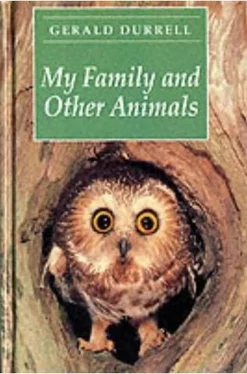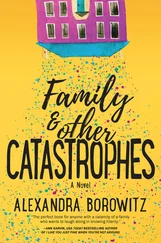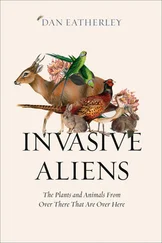Gerald Durrell - My family and other animals
Здесь есть возможность читать онлайн «Gerald Durrell - My family and other animals» весь текст электронной книги совершенно бесплатно (целиком полную версию без сокращений). В некоторых случаях можно слушать аудио, скачать через торрент в формате fb2 и присутствует краткое содержание. Жанр: Природа и животные, на английском языке. Описание произведения, (предисловие) а так же отзывы посетителей доступны на портале библиотеки ЛибКат.
- Название:My family and other animals
- Автор:
- Жанр:
- Год:неизвестен
- ISBN:нет данных
- Рейтинг книги:3 / 5. Голосов: 3
-
Избранное:Добавить в избранное
- Отзывы:
-
Ваша оценка:
- 60
- 1
- 2
- 3
- 4
- 5
My family and other animals: краткое содержание, описание и аннотация
Предлагаем к чтению аннотацию, описание, краткое содержание или предисловие (зависит от того, что написал сам автор книги «My family and other animals»). Если вы не нашли необходимую информацию о книге — напишите в комментариях, мы постараемся отыскать её.
My family and other animals — читать онлайн бесплатно полную книгу (весь текст) целиком
Ниже представлен текст книги, разбитый по страницам. Система сохранения места последней прочитанной страницы, позволяет с удобством читать онлайн бесплатно книгу «My family and other animals», без необходимости каждый раз заново искать на чём Вы остановились. Поставьте закладку, и сможете в любой момент перейти на страницу, на которой закончили чтение.
Интервал:
Закладка:
'So the French and British Fleets were slowly drawing together for what was to be the decisive sea battle of the war. When the enemy was sighted, Nelson was on the bridge bird-watching through his telescope... he had already been warned of the Frenchmen's approach by a friendly gull. .. eh ?... oh, a greater black-backed gull I think it was... well the ships manoeuvred round each other ... of course they couldn't move so fast in those days, for they did everything by sail... no engines... no, not even outboard engines.... The British sailors were a bit worried because the French seemed so strong, but when they saw that Nelson was so little affected by the whole thing that he was sitting on the bridge labelling his birds'-egg collection, they decided that there was really nothing to be scared about '
The sea was like a warm, silky coverlet that moved my body gently to and fro. There were no waves, only this gentle underwater movement, the pulse of the sea, rocking me softly. Around my legs the coloured fish nicked and trembled, and stood on their heads while they mumbled at me with toothless gums. In the drooping clusters of olives a cicada whispered gently to itself.
'... and so they carried Nelson down below as quickly as possible, so that none of the crew would know he had been hit. . . . He was mortally wounded, and lying below decks with the battle still raging above, he murmured his last words: "Kiss me, Hardy," and then he died.... What? Oh yes. Well, he had already told Hardy that if anything happened to him he could have his birds' eggs ... so, though England had lost her finest seaman, the battle had been won, and it had far-reaching effects in Europe....'
Across the mouth of the bay a sun-bleached boat would pass, rowed by a brown fisherman in tattered trousers, standing in the stern and twisting an oar in the water like a fish's tail. He would raise one hand in lazy salute, and across the still, blue water you could hear the plaintive squeak of the oar as it twisted, and the soft clop as it dug into the sea.
CHAPTER FIVE
A Treasure of Spiders
ONE hot, dreamy afternoon, when everything except the shouting cicadas seemed to be asleep, Roger and I set out to see how far we could climb over the hills before dark. We made our way up through the olive-groves, striped and dappled with white sunlight, where the air was hot and still, and eventually we clambered above the trees and out on to a bare, rocky peak, where we sat down for a rest. The island dozed below us, shimmering like a water-picture in the heat-haze: grey-green olives; black cypresses; multicoloured rocks of the sea-coast; and the sea smooth and opalescent, kingfisher-blue, jade-green, with here and there a pleat or two in its sleek surface where it curved round a rocky, olive-tangled promontory. Directly below us was a small bay with a crescent-shaped rim of white sand, a bay so shallow, and with a floor of such dazzling sand that the water was a pale blue, almost white. I was sweaty after the ascent, and Roger sat with flopping tongue and froth-flecked whiskers. We decided that we would not climb the hills after all; we would go for a bathe instead. So we hurried down the hillside until we reached the little bay, empty, silent, asleep under the brilliant shower of sunlight. We sat in the warm, shallow waters, drowsily, and I delved in the sand around me. Occasionally I found a smooth pebble, or a piece of bottle which had been rubbed and licked by the sea until it was like an astonishing jewel, green and translucent. These finds I handed to Roger, who sat watching me. He, not certain what I expected him to do but not wishing to offend me, took them delicately in his mouth. Then, when he thought I was not looking, he would drop them back into the water and sigh deeply.
Later, I lay on a rock to dry, while Roger sneezed and clopped his way along the shallows in an attempt to catch one of the blue-finned blennies, with their pouting, vacant faces, which flipped from rock to rock with the speed of swallows. Breathing heavily and staring down into the dear water, Roger followed them, a look of intense concentration on his face. When I was dry, I put on my shorts and shirt and called to Roger. He came relucantly, with many a backward glance at the blennies which still flicked across the sandy, sun-ringed floor of the bay. Coming as close to me as possible, he shook himself vigorously, showering me with water from his curly coat.
After the swim, my body felt heavy and relaxed, and my skin as though it was covered with silky crust of salt. Slowly and dreamily we made our way on to the road. Discovering that I was hungry, I wondered which was the nearest cottage where I could get something to eat. I stood kicking up puffs of fine white dust from the road as I considered this problem. If I went to see Leonora, who undoubtedly lived the nearest, she would give me figs and bread, but she would also insist on giving me the latest bulletin on her daughter's state of health. Her daughter was a husky-voiced virago with a cast in one eye, whom I cordially disliked, so I had no interest in her health. I decided not to go to Leonora; it was a pity, for she had the best fig-trees for miles around, but there was a limit to what I could endure for the sake of black figs. If I went to see Taki, the fisherman, he would be having his siesta, and would merely shout, 'Go away, little corn-top,' from the depths of his tightly shuttered house. Christaki and his family would probably be about, but in return for food they would expect me to answer a lot of tedious questions: Was England bigger than Corfu? How many people lived there? Were they all lords? What was a train like? Did trees grow in England? and so on, interminably. If it had been morning I could have cut through the fields and vineyards, and before reaching home I would have fed well on contributions from various of my friends on the way: olives, bread, grapes, figs, ending perhaps with a short detour that would take me through Philomena's fields, where I could be sure of ending my snack with a crisp, pink slice of water-melon, cold as ice. But now it was siesta time, and most of the peasants were asleep in their houses behind tightly closed doors and shutters. It was a difficult problem, and while I thought about it the pangs of hunger grew, and I kicked more energetically at the dusty road, until Roger sneezed protestingly and gave me an injured look.
Suddenly I had an idea. Just over the hill lived Yani, the old shepherd, and his wife, in a minute, sparkling white cottage. Yani, I knew, had his siesta in front of his house, in the shade of his grape-vine, and if I made enough noise approaching the house he would wake up. Once awake, it was certain that he would offer me hospitality. There was not a single peasant house you could visit and come empty away. Cheered by this thought, I set off up the stony, meandering pathway created by the pattering hooves of Yard's goats, over the brow of the hill and into the valley, where the red roof of the shepherd's house gleamed among the giant olive-trunks. When I judged I was close enough, I stopped and threw a stone for Roger to retrieve. This was one of Roger's favourite pastimes, but once having started it you had to continue, or else he would stand in front of you and bark hideously until you repeated the performance in sheer desperation. He retrieved the stone, dropped it at my feet and backed away expectantly, ears cocked, eyes gleaming, muscles taut and ready for action. I ignored both him and the stone. He looked faintly surprised; he examined the stone carefully, and then looked at me again. I whistled a short tune and looked up into the sky. Roger gave an experimental yap; then, seeing I still took no notice, he followed it up with a volley of deep, rich barks that echoed among the olives. I let him bark for about five minutes. By this time I felt sure Yani must be aware of our arrival. Then I threw the stone for Roger, and as he fled after it joyfully, I made my way round to the front of the house.
Читать дальшеИнтервал:
Закладка:
Похожие книги на «My family and other animals»
Представляем Вашему вниманию похожие книги на «My family and other animals» списком для выбора. Мы отобрали схожую по названию и смыслу литературу в надежде предоставить читателям больше вариантов отыскать новые, интересные, ещё непрочитанные произведения.
Обсуждение, отзывы о книге «My family and other animals» и просто собственные мнения читателей. Оставьте ваши комментарии, напишите, что Вы думаете о произведении, его смысле или главных героях. Укажите что конкретно понравилось, а что нет, и почему Вы так считаете.











